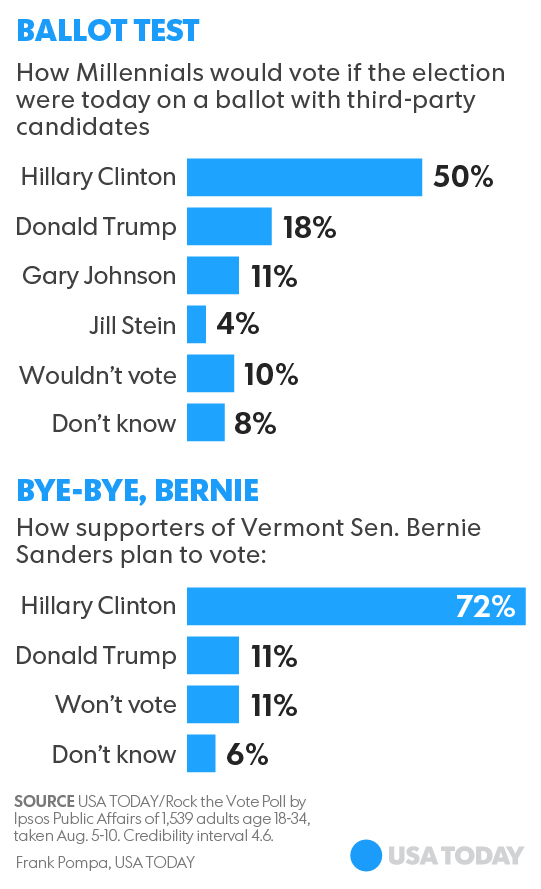Two-Thirds of Millennials Disgusted with "Binary Choice" Between Trump & Clinton
"The election is a complete joke."

According to a new USA Today/Rock The Vote survey of millennials, voters under the age of 35 really dislike the Republican Party and its presidential nominee, Donald Trump.
Given the GOP's and Trump's hostility to immigrants and immigration—stances that particularly alienate younger Americans—that's not surprising. In fact, it's in line with previous polls showing the Republican Party facing an almost-existential crisis among younger voters. The 2014 Reason-Rupe poll of millennials, for instance, found that twice as many (43 percent) of 18-to-29-year-olds identified as Democratic as Republican. While George W. Bush split the youth vote with Al Gore in 2000, Barack Obama won 18-to-29-year-olds by 34 points in 2008 and 22 points in 2012.
In the new survey, half of those under 35 say they identify with or lean toward the Democratic Party; just 20% identify with or lean toward the Republican Party. Seventeen percent are independents, and another 12% either identify with another party or don't know.
Trump's weakness among younger voters is unprecedented, lower even than the 32% of the vote that the Gallup Organization calculates Richard Nixon received among 18-to-29-year-old voters in 1972, an era of youthful protests against the Vietnam War.

A total of 29 percent of millennials said they are independent, identify with a third party, or don't know which party they care for.
When it comes to the presidential candidates, Trump pulls just 20 percent compared to Clinton's 50 percent. Libertarian Gary Johnson pulls 11 percent (higher than his overall popularity of about 8 percent), and Green Party nominee Jill Stein gets 4 percent. Ten percent say they won't vote and another 8 percent aren't sure who they might support.
The polls of 1,500 millennials was conducted online between August 5 and 10 (frustratingly, USA Today doesn't provide questions or cross-tabs). Respondents viewed the GOP convention in Cleveland negatively, which Trump's rating going down compared to earlier polls.
They didn't like what they saw at the GOP conclave in Cleveland. At least 50% of those surveyed say Trump seemed less presidential, less credible and less trustworthy afterwards. By more than 2-1, they say he seemed less human and less accessible. On each of five characteristics, Trump's standing fell.
Most millennials now say that the economy, college costs, national security, and law-enforcement issues top their concerns, according to the poll. By a 6-to-1 count, reports USA Today, Clinton supporters see police mistreatment of blacks and minorites as a bigger problem than violence against cops. Trump supporters see those two issues as equally pressing.
Yet it's wrong to say that Hillary Clinton is actually anything like the choice of the younger generation. Even as new polls by The Washington Post/ABC News both confirm the general findings of the USA Today/Rock The Vote survey, they add a strong sense of despair and disgust among millennials for both major-party candidates.
Clinton and Trump, reports The Washington Post,
are deeply polarizing with younger Americans, just as they are with the broader population. Seventy-two percent said they have an unfavorable view of Trump, while 49 percent said the same of Clinton. An overwhelming majority — 68 percent — said they are dissatisfied with the choice of Clinton or Trump.
One-quarter of younger voters said in the two Post-ABC polls that they would support a third-party candidate. In a four-way race, Clinton leads among younger voters with 43 percent, followed by Trump at 25 percent, Libertarian Party candidate Gary Johnson at 16 percent and Green Party candidate Jill Stein at 9 percent.
One person interviewed summed up widely shared negative feelings:
"This election is a complete joke," lamented Donovan DeWeese, 25, a pantry chef at a steakhouse in Fort Collins.
"This is my future," he said. "When I have kids, this will be something they remember me for. When my parents were this age, they had candidates like JFK and Ronald Reagan. These candidates we have now are not inspiring."
The Post goes on to note that millennials' responses are largely reactions to public personality traits of the candidates, rather than substantive policy issues. That too makes a fair amount of sense, as Clinton and Trump agree on broad policies such as trade protectionism and foreign interventionism; despite kinder election-year rhetoric toward immigrants, Clinton has a long track record of hostility toward immigrants as a senator and secretary of state. While she is pushing free in-state tuition at public universities and some sort of relief of student debt, she's also openly hostile to the sharing economy and favors broad surveillance-state measures, both of which put her crossways with millennials.
In 2014, Reason published a special issue of Reason and a set of web-only features about millennials, politics, and culture. Check it out here.
And last year, we asked GOP pollster Kristen Soltis Anderson, author of The Selfie Vote: Where Millenials are Leading America (And How Republicans Can Keep Up), why the party of Lincoln sucked so bad at winning young voters. Take a look:
